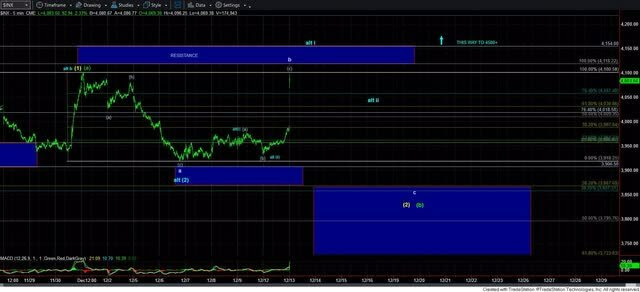Yet another week of head-scratching was seen in the market this past week. The CPI came in lower than the prior report, and the market rallied strongly through the lower resistance region I outlined last weekend. And it made most people uber-bullish, believing we were heading directly to the 4300 region in the S&P 500.
Yet, if you recall what I had said in my update last week, I was quite specific that any rally through resistance had to have been a 5-wave structure to tell us we were ready to attack 4300. The rally only took shape as a 3-wave structure. As you can see from the attached chart, I maintained that the rally was a b-wave (corrective rally), with a c-wave decline yet to follow.

Within the following 15 minutes after the chart above was posted, I provided another update to our members, noting that should we break back below 4034, it makes it likely that we are heading down toward the larger degree support region I have been outlining for weeks.
Moreover, two weeks ago, I outlined the potential of testing the 4118-4154 region again (as the futures did before the market opened this past Tuesday) and still drop down to the larger degree support region mentioned earlier. When a bullish move fails to strike the ideal target zone (the 4118-4154 region we missed in the previous rally), we often see the b-wave of the ensuing correction come back to strike it.
This is exactly what we experienced this past week. This is why I made it quite clear that only if the rally through our lower resistance completed 5-waves up would the market tell us that we would rally to 4300 sooner than I had expected. Yet, 3-waves up is all we got, confirmed by the breakdown below 4034, as I also explained in real time to our members.
Now, I want you to take a moment and think about the main highs and lows we have struck over the last two months. The low struck on Oct. 13 was a spike down and strong reversal, which began a two-month rally after a lower-than-expected CPI report, which took everyone by surprise when we ended that day hugely positive. Herein the market fooled you once.
And then we struck a high and reversed strongly on a day when the CPI was lower than expected, which took everyone by surprise when we ended that day with a huge reversal, which kick-started the decline I wanted to see in our support region below. Herein the market fooled you twice. So, as the saying goes, shame on you.
While the substance of a news event can certainly act as a catalyst for a market move, the substance of that report will not always provide you with the correct directional cue for the eventual move in the market. The highs and lows struck in the last two months are perfect examples of this phenomenon - we bottomed on a bearish report and topped on a bullish one.
Yet, most will simply ignore what just happened and move on to the next data set that they believe will move the market. But, if you are being honest with yourself, I think it’s time to consider that maybe what you are doing will not help you going forward.
As one of my members commented this past week:
"I mean, bottoming on the worst inflation print and topping on the best... takes a lot of mental gymnastic to make that square without EWT"
I do love quoting these two paragraphs from Robert Prechter’s book The Socionomic Theory of Finance (which is a must-read for every single investor and trader if you want to understand how the market works), as it quite succinctly and accurately explains how the masses approach the market so wrongly:
“Observers’ job, as they see it, is simply to identify which external events caused whatever price changes occur. When news seems to coincide sensibly with market movement, they presume a causal relationship. When news doesn’t fit, they attempt to devise a cause-and-effect structure to make it fit. When they cannot even devise a plausible way to twist the news into justifying market action, they chalk up the market moves to “psychology,” which means that, despite a plethora of news and numerous inventive ways to interpret it, their imaginations aren’t prodigious enough to concoct a credible causal story.
Most of the time it is easy for observers to believe in news causality. Financial markets fluctuate constantly, and news comes out constantly, and sometimes the two elements coincide well enough to reinforce commentators’ mental bias towards mechanical cause and effect. When news and the market fail to coincide, they shrug and disregard the inconsistency. Those operating under the mechanics paradigm in finance never seem to see or care that these glaring anomalies exist.”
As far as the market is concerned, even when we were near the highs, I outlined in my articles that I was looking for the market to return to the 3723-3867 region. Many of you will brush aside my view again and claim that the only reason we are here is because of what Powell said during the last Fed meeting.
Yet, you completely ignore the fact that the market reversed the day before Powell spoke and began the expected decline we outlined to our members. Moreover, you also ignore that the market was even positive after Mr. Powell spoke and only went negative well after he finished speaking. Therefore, if you continue to maintain your belief, you must assume that the market is omniscient, clairvoyant, or crazy. So, not only were you fooled twice, you are allowing yourself to continue to be fooled. Maybe it’s time to take off the blinders?
Many of you have commented that you simply do not appreciate how I write my missives, as you feel it comes across as arrogant or too “all-knowing.” It is the only way to get people to consider the truth of what I am trying to teach. Believe it or not, sometimes you have to smack people across the face for them to accept reality.
Since my goal has always been to teach people how to do better in the market, this is the approach I take, whether you like it or not. And, based on the thousands of notes and comments I get from our members over the years about how we have changed their lives, I will continue to do what works. This was posted to me by one of our approximately 1000 money manager clients this past week:
“You have no idea what your guidance has done to change lives of some who do not even know your name.”
In the meantime, we are now well within the support region I outlined weeks ago. I will be watching the market quite intently over the coming week to see if we develop the bottoming signals that I want to see.
And, if the market provides us with those cues, then we will have a low-risk buying opportunity over the coming week or two, which we can ride to the 4300+ region in the coming months. And, the reason I say it is a low-risk buying opportunity is that the market also provides us with our stop-out point as well.
So, in summary, depending on how the market reacts over the coming week within our support region will tell us quite clearly if we will set up to rally to 4300+ as we move into 2023. For now, this remains my expectation. But I will be listening to the market's cues before acting on my expectation.
